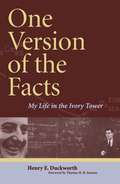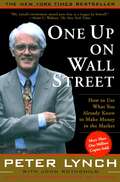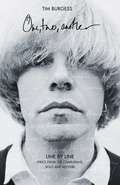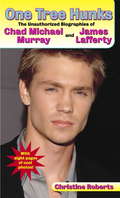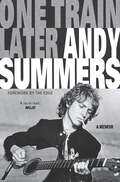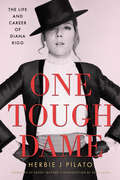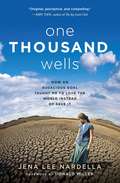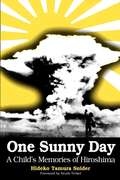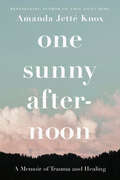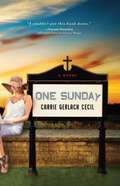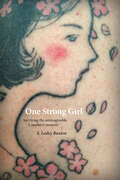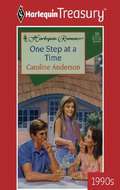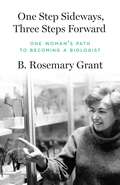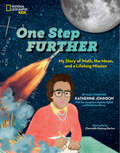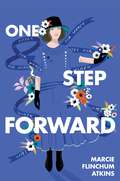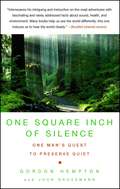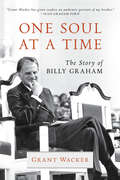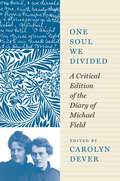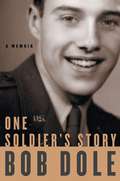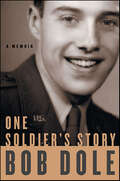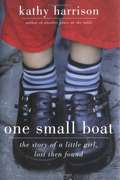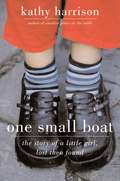- Table View
- List View
One Version of the Facts: My Life in the Ivory Tower
by Henry E. DuckworthIn his engaging memoirs, One Version of the Facts: My Life in the Ivory Tower, Dr. Henry Duckworth takes readers from his student days in Winnipeg and Chicago in the 1930s to his time as president of the University of Winnipeg (1971-1981) and chancellor of the University of Manitoba. An accomplished physicist, he wrote the first definitive text in English on mass spectroscopy, discovered the last stable isotope (platinum), and helped create important programs at universities and at the National Research Council. He also served on numerous councils for scientific and university organizations, and rubbed shoulders with Nobel Prize winners at international conferences.With humour and modesty, Henry Duckworth recalls trends, changes, and crises he witnessed throughout his long university career. He offers his observations, his opinions, his "version of the facts," providing a special insight into critical years in Canada's university education history, as well as his own specialty, atomic research.
One Up On Wall Street: How To Use What You Already Know To Make Money In (Irresistible Miniature Editionstm Ser.)
by Peter LynchMore than one million copies have been sold of this seminal book on investing in which legendary mutual-fund manager Peter Lynch explains the advantages that average investors have over professionals and how they can use these advantages to achieve financial success.America&’s most successful money manager tells how average investors can beat the pros by using what they know. According to Lynch, investment opportunities are everywhere. From the supermarket to the workplace, we encounter products and services all day long. By paying attention to the best ones, we can find companies in which to invest before the professional analysts discover them. When investors get in early, they can find the &“tenbaggers,&” the stocks that appreciate tenfold from the initial investment. A few tenbaggers will turn an average stock portfolio into a star performer. Lynch offers easy-to-follow advice for sorting out the long shots from the no-shots by reviewing a company&’s financial statements and knowing which numbers really count. He offers guidelines for investing in cyclical, turnaround, and fast-growing companies. As long as you invest for the long term, Lynch says, your portfolio can reward you. This timeless advice has made One Up on Wall Street a #1 bestseller and a classic book of investment know-how.
One Two Another: Line By Line: Lyrics from The Charlatans, Solo and Beyond
by Tim BurgessA Rough Trade Book of the Year 'From lists to experiences and stories, there are no rules. A good song is a good song whoever writes it and however the writing happens.'Tim Burgess is a musical maverick and legend. Over the past three decades, he has cultivated a lyrical style that is equal parts searing, elusive and raw. Brimming with nods to an eclectic array of influences, from French chanson to East Coast rap, his words provide vivid snapshots of modern life, its highs and lows, and the things we do to get by.For the first time Tim's collected lyrics are accompanied by his revealing commentary, featuring backstage anecdotes, advice on how to conjure up the music muse, poignant reflections - and insight into a very idiosyncratic songwriting process.One Two Another chronicles the evolution of Tim's songwriting and reveals the method behind the madness.'Tim Burgess is a crusader and vinyl's epic voyager. He knows why pop's art, a culture and a cure. Learn and listen. He knows good things' Johnny Marr'You can't feel blue around Tim. He makes you feel happy, not just about music but about life. Even the most cynical of souls (mine) become infected by his gorgeous energy. Plus he gives good vinyl' Sharon Horgan
One Two Another: Line By Line: Lyrics from The Charlatans, Solo and Beyond
by Tim BurgessA Rough Trade Book of the Year 'From lists to experiences and stories, there are no rules. A good song is a good song whoever writes it and however the writing happens.'Over the past three decades, Tim Burgess has cultivated a lyrical style that is equal parts searing, elusive and raw. Brimming with nods to an eclectic array of influences, from French chanson to East Coast rap, his words provide vivid snapshots of modern life, its highs and lows, and the things we do to get by.For the first time Tim's collected lyrics are accompanied by his revealing commentary, featuring backstage anecdotes, advice on how to conjure up the music muse, poignant reflections - and insight into a very idiosyncratic songwriting process.One Two Another chronicles the evolution of Tim's songwriting and reveals the method behind the madness.'Tim Burgess is a crusader and vinyl's epic voyager. He knows why pop's art, a culture and a cure. Learn and listen. He knows good things' Johnny Marr'You can't feel blue around Tim. He makes you feel happy, not just about music but about life. Even the most cynical of souls (mine) become infected by his gorgeous energy. Plus he gives good vinyl' Sharon Horgan
One Tree Hunks
by Christine RobertsRecounts the lives and careers of the actors portrayed as half-brothers with little in common other than their love of basketball in the popular television series, "One Tree Hill."
One Train Later: A memoir
by Andy SummersFrom his first guitar at age 13 and his early days on the Bournemouth music scene, to his relationships and encounters in London and the US with Zoot Money's Big Roll Band, Jimi Hendrix, Eric Clapton, John Belushi and Eric Burdon, among others, Andy Summers proves himself a master of telling detail and dramatic anecdote. But, of course, the early work is only part of the story, and Andy's account of his role as guitarist for The Police - a gig he almost didn't get, despite the wishes of bassist/singer Sting, until a chance encounter with drummer Stewart Copeland on a London train - is the first full inside story of the band ever published. The heights of fame that The Police achieved have rarely been duplicated, and they were rivaled only by the personal chaos that such success brought about, an insight never lost on Summers in the telling. With never-before-published photos from Summers' personal collection, One Train Later is a constantly surprising and poignant memoir, and the work of a first-class writer.
One Tough Dame: The Life and Career of Diana Rigg (Hollywood Legends Series)
by Herbie J PilatoOne Tough Dame: The Life and Career of Diana Rigg offers a sweeping portrait of the revered performer’s life and career. Deemed a Dame Commander of the Order of the British Empire in 1994, Diana Rigg (1938–2020) initially found fame as super sleuth Mrs. Emma Peel in the 1960s BBC/ABC-TV espionage series The Avengers. A classically trained and multi-award-winning thespian, Rigg is known for her diverse body of work — from her big-screen debut in 1969 as Countess Teresa di Vincenzo, wife of James Bond in On Her Majesty’s Secret Service, to her Tony Award–winning, leading role in Medea on Broadway, culminating with her Emmy-nominated portrayal as Lady Olenna Tyrell on the heralded small-screen gem Game of Thrones. This eclectic volume traces Rigg’s career as a renowned star of television, film, and the stage. The author includes insights from rare, archived interviews, encompassing both video dialogues conducted by the University of Kent and Oxford Union. The meticulously curated archival material is further complemented by equally rare photos and retrospections drawn from diverse media sources and hitherto unpublished accounts from the people who knew Rigg best, affording readers an unprecedented, all-encompassing glimpse into her private world. With exclusive commentary from Rupert Macnee (son of Riggs’s Avengers costar and dear friend Patrick Macnee); the show’s stunt coordinator/director Ray Austin; actors Samuel West, Bernie Kopell, Barbara Barrie, Juliet Mills, John Schuck, and Damon Evans; director Bruce Beresford; and documentarian David Naylor, among others, One Tough Dame delivers an in-depth perspective of a beloved, brave, brilliant, and trailblazing actor.
One Thousand Wells
by Donald Miller Jena Lee NardellaJena Nardella, cofounder of Blood:Water and one of Christianity Today's 33 Under 33, shares how her passion for saving the world grew into a humbler long-term calling of loving the world in all its brokenness in this beautifully written memoir.Ten years ago, Jena Lee Nardella was a fresh-out-of-college, twenty-something with the lofty goal of truly changing the world. Armed with a diploma, a thousand dollars, and a dream to build one thousand wells in Africa, she joined forces with Grammy Award-winning band Jars of Clay to found Blood:Water and begin her mission. Jena's dream for her nonprofit turned that initial $1 into $20, and then $100, and today into more than $25 million. Working throughout eleven countries in Africa, Blood:Water has provided healthcare for over 62,000 people in HIV-affected areas and has partnered with communities to provide clean water for more than one million people in Africa. But along the way she faced many harsh realities that have tested her faith, encountered corruption and brokenness that nearly destroyed everything she'd fought for, and taught her that wishful thinking will not get you very far. Jena discovered that true change comes only when you stop trying to save the world and allow yourself to love it, even when it breaks your heart. With a fresh, intelligent, and winsome voice, Jena Lee Nardella weaves an evocative personal narrative filled with honest and hard-won lessons that demonstrate the amazing things that can happen when you fight for your dreams.
One Sunny Day: A Child's Memories of Hiroshima
by Hideko Tamura SniderWhen she was eleven years old Hideko Tamura came home to Hiroshima from boarding-school. Two days later the U.S. dropped the atomic bomb. In chilling detail the author describes the blast and its aftermath. She recounts her long and painful recovery from the trauma, a journey that leads her to nursing and the care of cancer patients.
One Sunny Afternoon: A Memoir of Trauma and Healing
by Rowan Jette KnoxFrom the bestselling author of Love Lives Here, a deeply personal memoir about facing life-long trauma head-on, and bravely healing the scars that endure.For writer and human rights advocate Rowan Jetté Knox, the inspiring story of his family&’s journey of love and acceptance, when both his child and partner came out as transgender one after the other, was the hopeful beginning to their new lives. Their tale, shared in Rowan&’s memoir Love Lives Here and embraced by readers everywhere, quickly found its way to the top of bestseller lists.Yet in the spring of 2020, Rowan began to experience targeted attacks on social media, and he soon became the subject of a small but very vocal group that criticized his book&’s success and his advocacy work. The intensity of the backlash grew and drove Rowan to contemplate suicide. But instead of taking his life, on one sunny afternoon, he went to the hospital to seek help.One Sunny Afternoon is a searing testament to Rowan Jetté Knox&’s extraordinary reckoning of his past and present to find hope in his future. Triggered by the online harassment, he wades through his personal history and details the incidents of violence, addiction and sexual assault that have haunted him. When Rowan eventually receives a complex trauma disorder diagnosis and dedicates himself to recovery, he emerges with newfound strength, resiliency and confidence.One Sunny Afternoon is a profoundly moving and candid account of how trauma can shape us rather than define us, and reveals how even in our darkest moments—and on our most hopeless days—light can find its way in.
One Sunday
by Carrie Gerlach CecilIn this humorous and heartfelt novel, a beleaguered young woman must shed her career, identity, and power persona to learn how to love and forgive herself, others, and God.At age thirty-seven, Alice Ferguson has everything an ambitious, intellectual, self-made woman could want. She has captured a career as an editor of a tabloid magazine, launched her own website full of Hollywood gossip, and even clawed her way into a second-hand pair of Prada shoes. She has also finally landed a husband--no small feat, as it required getting pregnant with his baby. But when Alice becomes pregnant and experiences health problems, her world is turned upside down. To save her life and the life of her unborn child, she must leave Los Angeles and the stress of her bicoastal career, exchanging the late-night parties of sunny California for the suburbs of Nashville. With a weak smile and an even weaker heart, she soon finds herself living with a husband she barely knows, ensconced in a gated community brimming with perky, plastic, pony-tailed housewives. And then, at the gentle urging of a new friend, she agrees to attend church one Sunday afternoon. What begins as an experiment beyond her comfort zone sparks something much bigger, as Alice begins to look deep within herself only to find insecurity, fear, and loneliness. One Sunday charts an endearing character's journey from moral ambiguity through madness, tears, laughter, and heartbreak to a connection with the only One who can help heal her.
One Strong Girl: Surviving the Unimaginable, A Mother's Memoir
by S. Lesley BuxtonA mother&’s award–winning account of what it&’s like to lose a daughter to a rare debilitating disease. One Strong Girl is a bold description of what it means to deal with deep sorrow and still find balance and beauty in an age steeped in the denial of death. At ten, India climbed the highest on the rope at gymnastics, yet by sixteen was so weak she was unable to even dress herself. The narrative follows the six-year fight for answers from the medical community. Finally, after the genetic testing of India&’s DNA, it was discovered there were two mutations on her ASAH1 gene, a deadly combination. Today her cells are alive in a research lab at the University of Ottawa. This is a legacy that cuts both ways, a point of pride and pain. One Strong Girl is a story of what it&’s like to outlive an only child. It describes the intensity of loving a dying child and most importantly, the joy to be found, even amidst the sorrow.
One Step at a Time
by Caroline AndersonA promising representative cricketer, an accomplished student, ambitious and talented, Claire Anderson at 20 was facing the brightest future, with the best times of her life beckoning. But one night everything abruptly changed. Sexually assaulted by a friend after attending a party, Claire found her wide world narrowing to one of bleak despair, beset by hopelessness, and in the grip of a crippling depression. She was tormented by questions: 'Was it my fault? Why has my attacker not been held accountable? What can I do to escape these memories? 'Five years later, still haunted by these questions and armed with a few packets of pills, she headed to a tranquil spot in search of a single, final answer: suicide. Saved by a phone call, this is the remarkable story of Claire's journey back from that dark place to a point where she could accept the events of her past and, at last, herself. From a life-changing moment on an Outward Bound course, and through the rigours of training towards and completing an Ironman, Claire redefined herself as a strong, capable woman who not only has changed her own life, but who can now impact upon others' lives as well, through sharing her story and through her sponsorship of Outward Bound candidates. Claire's selfless, moving tale charts her course, from sadness to gladness, from despair to triumph. This is the best kind of self-help book: the story of a woman who helped herself back from the brink, one small but rewarding step at a time.
One Step Sideways, Three Steps Forward: One Woman’s Path to Becoming a Biologist
by B. Rosemary GrantThe story of the unorthodox and inspiring life and career of a pioneering biologist Scientist Rosemary Grant&’s journey in life has involved detours and sidesteps—not the shortest or the straightest of paths, but one that has led her to the top of evolutionary biology. In this engaging and moving book, Grant tells the story of her life and career—from her childhood love of nature in England&’s Lake District to an undergraduate education at the University of Edinburgh through a swerve to Canada and teaching, followed by marriage, children, a PhD at age forty-nine, and her life&’s work with Darwin&’s finches in the Galápagos islands. Grant&’s unorthodox career is one woman&’s solution to the problem of combining professional life as a field biologist with raising a family.Grant describes her youthful interest in fossils, which inspired her to imagine another world, distant yet connected in time—and which anticipated her later work in evolutionary biology. She and her husband, Peter Grant, visited the Galápagos archipelago annually for forty years, tracking the fates of the finches on the small, uninhabited island of Daphne Major. Their work has profoundly altered our understanding of how a group of eighteen species has diversified from a single ancestral species, demonstrating that evolution by natural selection can be observed and interpreted in an entirely natural environment. Grant&’s story shows the rewards of following a winding path and the joy of working closely with a partner, sharing ideas, disappointments, and successes.
One Step Further: My Story of Math, the Moon, and a Lifelong Mission
by Katherine JohnsonThe only autobiographical account in picture book format of NASA mathematician Katherine Johnson's remarkable life tells the story of the Hidden Figures hero as you've never read it before. Lyrical, read-aloud text brings readers along on the journey as she rises above adversity to find her place among the stars.
One Step Forward
by Marcie Flinchum AtkinsA Junior Library Guild Gold Standard Selection!One Step Forward is a compelling debut YA historical fiction novel in verse about Matilda Young—the youngest American suffragist imprisoned for picketing the White House to demand women’s right to vote.Raised in a politically divided family, Matilda wondered if she could be as courageous as her older sister who fought for suffrage. Joining the radical protest movement came with plenty of risk. Women were routinely scorned, harassed, arrested—and worse. And taking a stand for her rights could tear her family apart.Told in powerful verse, One Step Forward follows Matilda's coming-of-age journey as she takes her first step into action. Amid the backdrop of World War I, Matilda’s story vividly highlights the extreme mental, physical, and emotional battles faced by the protestors leading up to the passage of the Nineteenth Amendment. It also reveals the bravery, hard work, and spirit of the women who paved the way for future generations to use their voices and votes.
One Square Inch of Silence
by Gordon Hempton John GrossmannIn the visionary tradition of Rachel Carson's Silent Spring, One Square Inch of Silence alerts us to beauty that we take for granted and sounds an urgent environmental alarm. Natural silence is our nation's fastest-disappearing resource, warns Emmy-winning acoustic ecologist Gordon Hempton, who has made it his mission to record and preserve it in all its variety--before these soul-soothing terrestrial soundscapes vanish completely in the ever-rising din of man-made noise. Recalling the great works on nature written by John Muir, John McPhee, and Peter Matthiessen, this beautifully written narrative, co-authored with John Grossmann, is also a quintessentially American story--a road trip across the continent from west to east in a 1964 VW bus. But no one has crossed America like this. Armed with his recording equipment and a decibel-measuring sound-level meter, Hempton bends an inquisitive and loving ear to the varied natural voices of the American landscape--bugling elk, trilling thrushes, and drumming, endangered prairie chickens. He is an equally patient and perceptive listener when talking with people he meets on his journey about the importance of quiet in their lives. By the time he reaches his destination, Washington, D.C., where he meets with federal officials to press his case for natural silence preservation, Hempton has produced a historic and unforgettable sonic record of America. With the incisiveness of Jack Kerouac's observations on the road and the stirring wisdom of Robert Pirsig repairing an aging vehicle and his life, One Square Inch of Silence provides a moving call to action. More than simply a book, it is an actual place, too, located in one of America's last naturally quiet places, in Olympic National Park in Washington State.
One Soul at a Time: The Story of Billy Graham (Library of Religious Biography (LRB))
by Grant WackerFor more than five decades Billy Graham (1918-2018) ranked as one of the most influential voices in the Christian world. Nearly 215 million people around the world heard him preach in person or through live electronic media, almost certainly more than any other person. For millions, Graham was less a preacher than a Protestant saint. While remaining orthodox at the core, over time his approach on many issues became more irenic and progressive. And his preaching continued to resonate, propelled by his powerful promise of a second chance. Drawing on decades of research on Billy Graham and American evangelicalism, Grant Wacker has marshalled personal interviews, archival research, and never-before-published photographs from the Graham family and others to tell the remarkable story of one of the most celebrated Christians in American history. Where Wacker’s previous work on Graham, America’s Pastor, focused on the preacher’s relation to the nation’s culture, One Soul at a Time offers a sweeping, easy-to-read narrative of the life of the man himself.
One Soul at a Time: The Story of Billy Graham (Library of Religious Biography (LRB))
by Grant WackerChristianity Today 2020 Book Award of Merit in History/Biography For more than five decades Billy Graham (1918-2018) ranked as one of the most influential voices in the Christian world. Nearly 215 million people around the world heard him preach in person or through live electronic media, almost certainly more than any other person. For millions, Graham was less a preacher than a Protestant saint. While remaining orthodox at the core, over time his approach on many issues became more irenic and progressive. And his preaching continued to resonate, propelled by his powerful promise of a second chance. Drawing on decades of research on Billy Graham and American evangelicalism, Grant Wacker has marshalled personal interviews, archival research, and never-before-published photographs from the Graham family and others to tell the remarkable story of one of the most celebrated Christians in American history. Where Wacker&’s previous work on Graham, America&’s Pastor, focused on the preacher&’s relation to the nation&’s culture, One Soul at a Time offers a sweeping, easy-to-read narrative of the life of the man himself.
One Soul We Divided: A Critical Edition of the Diary of Michael Field
by Michael FieldThe first book-length selection from the extraordinary unpublished diary of the late-Victorian writer “Michael Field”—the pen name of two female coauthors and romantic partnersMichael Field was known to late-Victorian readers as a superb poet and playwright—until Robert Browning let slip Field’s secret identity: in fact, “Michael Field” was a pseudonym for Katharine Bradley (1846–1914) and Edith Cooper (1862–1913), who were lovers, a devoted couple, and aunt and niece. For thirty years, they kept a joint diary titled Works and Days that eventually reached almost 10,000 pages. One Soul We Divided is the first critical edition of selections from this remarkable unpublished work.A fascinating personal and literary experiment, the diary tells the extraordinary story of the love, art, ambitions, and domestic life of a queer couple in fin de siècle London. It also tells vivid firsthand stories of the literary and artistic worlds Bradley and Cooper inhabited and of their encounters with such celebrities as Browning, Oscar Wilde, W. B. Yeats, Aubrey Beardsley, and Bernard Berenson. Carolyn Dever provides essential context, including explanatory notes, a cast of characters, a family tree, and a timeline.An unforgettable portrait of two writers and their unexpected romantic, literary, and artistic marriage, One Soul We Divided rewrites what we think we know about Victorian women, intimacy, and sexuality.
One Soldier's Story: A Memoir
by Bob DoleA memoir detailing Bob Dole's entry into the army and his time serving before a German shell blast damages his spine and shoulder. His three years of recovery are detailed here.
One Soldier's Story: A Memoir
by Sen. Bob Dole“A poignant and inspiring memoir. . . . Dole’s odyssey of courage and determination can be a guideline to us all.”— Philadelphia InquirerIn his own words, Bob Dole tells his legendary World War II story—a personal odyssey of tremendous courage, sacrifice, and faithIn One Soldier’s Story, Dole recites the moving, inspirational story of his harrowing experience in World War II, and how he overcame life-threatening injuries long before rising to the top of the U.S. Senate. As a platoon leader in the famed 10th Mountain Division, 21-year-old Bob Dole was gravely wounded on a hill in the Italian Alps just two weeks before the end of the war. Trying to pull his radioman to safety during a fire-fight against a fortified German position, Dole was hit with shrapnel across his right shoulder and back. Over the next three years, not expected to survive, he lapsed in and out of a coma, lost a kidney, lost the use of his right arm and most of the feeling in his left arm. But he willed himself to live.Drawing on nearly 300 never-before-seen letters between him and his family during this period, Dole offers a powerful, vivid portrait of one man’s struggle to survive in the closing moments of the war. With insight and candor, Dole also focuses on the words, actions, and selfless deeds of countless American heroes with whom he served, including two fellow injured soldiers who later joined him in the Senate, capturing the singular qualities of his generation. He speaks here not as a politician, but as a wounded G.I. who went on to become one of our nation’s most respected statesmen. In doing so, he gives us a heartfelt story of uncommon bravery and personal faith-in himself, his fellow man, and a greater power.
One Small Candle: The Pilgrims' First Year in America
by Thomas J. FlemingOne Small Candle focuses on the vivid, deeply moving drama of the Pilgrims' first year in the New World. The book begins in London as Pilgrim representatives sign a contract with Christopher Jones, the crusty captain of the old freighter Mayflower. We accompany them on their harrowing voyage across the Atlantic, and march with them over the barren, wintry landscape of Cape Cod in their desperate search for the homesite they eventually find at Plymouth. Howling Indians harass this reconnaissance party, while the weary women and children left aboard the Mayflower struggle against despair. Plymouth at last discovered, we watch "Saints" and "Strangers" forge a common solidarity in their struggle against brutal weather and epidemic disease. But the story is by no means entirely grim and solemn. Young explorers get lost in the woods and climb trees to escape "roaring lions." There is a comic duel for the hand of a headstrong fifteen-year-old. We are present at a bizarre visit to the great Indian chief, Massasoit. With masterly skill, Mr. Fleming gives us life-size portraits of the Pilgrim leaders. The Pilgrims' unique achievements--the Mayflower Compact, their tolerance for other faiths, the strict separation of church and state--are discussed in the context of the first year's anxieties and crises. Special attention is given to the younger men who emerged in this first year as the real leaders of the colony--William Bradford and Miles Standish. And new insights are provided into the deep humanity and tolerance of the Pilgrims' spiritual shepherd, Elder William Brewster. The book ends with the first Thanksgiving. Already in the Pilgrim mind there is a dawning consciousness that they are the forerunners of a great nation. It is implicit in William Bradford's words, "As one small candle may light a thousand, so the light kindled here has shone unto many...."
One Small Boat: The Story of a Little Girl, Lost Then Found
by Kathy HarrisonDaisy was five when she first entered Kathy Harrison's bustling household. Mother of three children by birth, three by adoption, and a handful of foster kids always coming and going, Harrison had ten children under her roof at any given time. But Daisy was, in many ways, unique. Unlike the parents of most of Kathy's foster kids, Daisy's birth mother wasn't poor, uneducated, or drug-addicted. She just could not take care of a child, and the effects of this abandonment on Daisy were heart-wrenching. Fear and anxiety marked her every move; she scarcely ate, she spun restlessly around her room, and she seemed to have a severe speech impediment. After two weeks in Kathy's loving home, however, Daisy began to thrive. An intimate portrait of foster care in America and of the children whose lives are forever shaped by it, One Small Boat considers whether a sense of home and belonging can ever be restored to children after they have been taken away. In this book, Kathy Harrison describes the lessons she learned from Daisy, lessons about resilience after heartbreak, courage after fear, and the power of love to heal even the deepest wounds.
One Small Boat: The Story of a Little Girl, Lost Then Found
by Kathy HarrisonThis story of one little girl's journey through our foster-care system forms an intimate portrait of foster care in America and the children whose lives are forever shaped by it. <P><P>Augusten Burroughs called Kathy Harrison's memoir Another Place at the Table a riveting and profoundly moving story of a hero, disguised as an everyday woman. In One Small Boat, Harrison tells the story of one little girl who arrived on her doorstep, and describes how caring for this child was an experience that challenged everything she thought she knew about foster-care parenting and the needs of the children she shelters. Daisy was five when she arrived in Harrison's bustling home. Mother of three children by birth and three by adoption, and with a handful of foster kids always coming and going, Harrison had ten children under her roof at any given time. But Daisy was in many ways unique. Daisy's birth mother wasn't poor, uneducated, or drug addicted. She simply couldn't bring herself to take care of her little girl, and the effects on the child were heartrending. Daisy was unwilling to eat-even frightened of it-and seemed to have a severe speech impediment. After two weeks in Kathy's loving home, however, Daisy began to thrive. What had happened to her? And how can a foster-care parent give back all that has been taken from a child like Daisy-knowing that she might leave one day very soon? Harrison had seen many children pass through her doors, but this one touched her in a way she didn't immediately understand. One Small Boat will be of deep interest to anyone who has nurtured and cared for a child or anyone interested in the intricate web that is our social welfare system.
